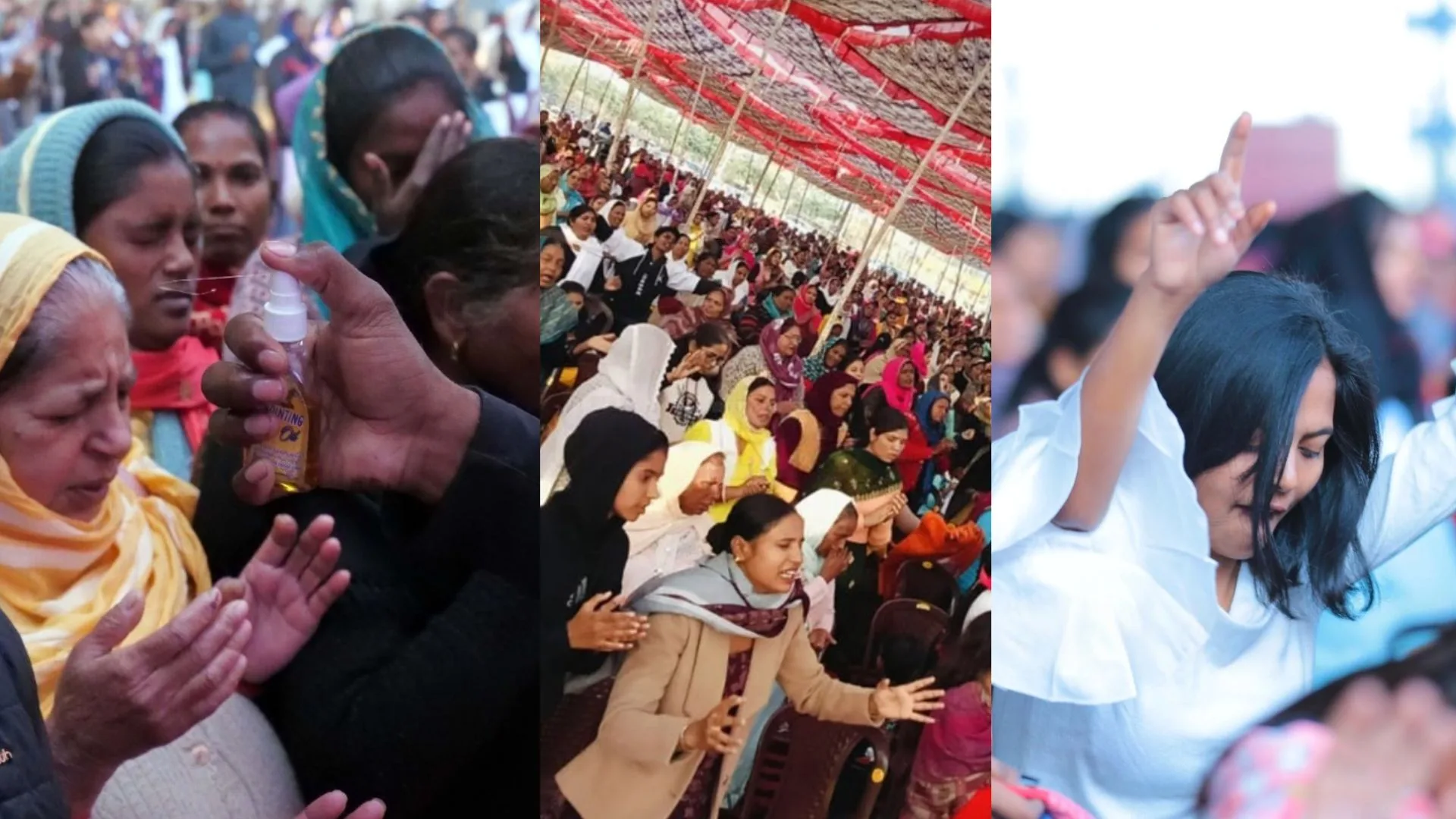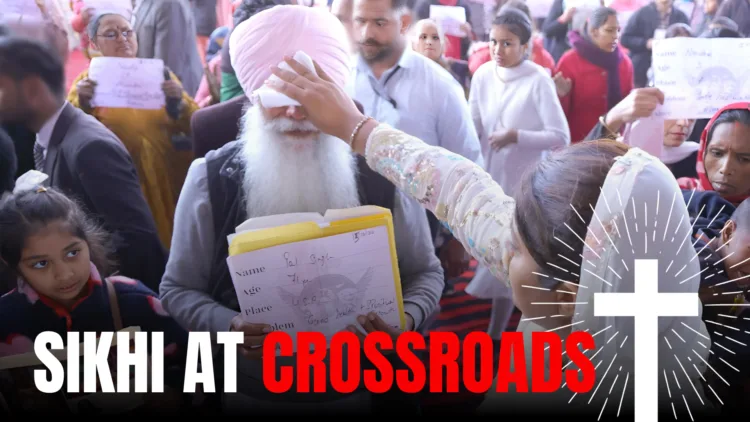We often see videos of people performing unusual acts while singing “Mera Yeshu Mera Yeshu” on social media and take them as entertainment. However, behind these videos lies a harsh reality about Punjab, a state once known for its prosperity and culture. From the dark days of terrorism to the massive drug addiction among youth and now a surge in religious conversions by church, this change is a caution for the state as well as the country.
Punjab, the land of patriotism and unparalleled sacrifices, is now facing an unprecedented challenge of religious conversions. This is the land where Guru Tegh Bahadur Ji, the ninth Sikh Guru, got the title “Hind Ki Chadar” for his sacrifice to protect Kashmiri Pandits from forced conversions. It is the land where the four Sahibzade of Guru Gobind Singh Ji chose death over converting to Islam. Yet, in every city and village of Punjab, religious conversions are taking place rapidly, with a large number of Sikhs converting to Christianity.
Christianity entered Punjab in 1834. John Lowrie and William Reed were the first missionaries to spread the word of Jesus Christ in the region. Its initial adherents were largely urban, literate, and socially diverse but so small in number that they were insignificant in the broader social mix of Sikhs and Hindus, with Sikhs being the largest group. This remained the case until recent decades, but the situation is now changing drastically. Interestingly, in a planned manner, Max Arthur Macauliffe, an evangelist was made to join the administrative service in 1862 and was sent to Punjab in 1864. To make him trustworthy of the Sikhs, he also converted to Sikhism. Macauliffe translated the sacred book Sri Guru Granth Sahib Ji into English with the help of Bhai Kan Singh Nabha. Later, he also wrote other books including the six volumes of The Sikhs, Their Religion Gurus. Bhai Kahan Singh Nabha’s book Hum Hindu Nahin was published in 1897-98 which is also the basis of present Khalistan. The conspiracy of the British continued to work in a very creative way to separate the Sikh society from the cultural mainstream of India.
In Punjab, conversions are taking place through various means, including monetary benefits, false promises of miracles, and the lure of visas to countries like Canada, the USA, the UK, and Australia. All of this appears to be part of a systematic plan to alter the state’s demography. As a result, Punjab is gradually inching toward becoming a Christian-majority state.
According to the 2011 Census, Christians constituted merely 1.3 per cent of Punjab’s population. However, some media reports and self-declared surveys by missionary groups suggest that this figure has now risen to 15 per cent. Religious institutions like the Shiromani Gurdwara Parbandhak Committee (SGPC) and Sikh leaders have largely failed to address this issue effectively.
Christians are now settled across Punjab but are more concentrated in Gurdaspur, Amritsar, Jalandhar, Ludhiana, and Ferozepur districts. These districts are now referred to as the “Church Belt” by some locals. Thousands of new churches and missionary centers have been built in these districts, with entire villages in Gurdaspur and Hoshiarpur reportedly converting to Christianity. It is believed that almost all villages have one or two converted Christian families in Punjab. Over 65,000 missionaries are active in the state. For example, Jalandhar alone is home to over 1,500 churches.
Thanks to pastors like Raju Rangila, Bajinder Singh, Ankur Narula, and others, who have converted a significant number of Dalits from both the Hindu and Sikh communities to Christianity. The rise of self-styled pastors and “Apostles” leading Christian Chanagi Sabhas is another concerning trend. These fraudulent pastors use dubious techniques, such as staged miracles, promises of cures from illness, bringing back the dead, resolving financial issues, and freeing from drug addiction, to attract innocent people primarily Dalits, Valmiki Hindus, and Mazhabi Sikhs and mislead them into conversion. The pastors and Church leaders have also composed songs praising Jesus on lines of Sikh kirtan.
Punjabi youth, eager to go abroad, are the first targets to these conversions. Missionaries promise them an easier path to obtaining visas if they embrace Christianity.
Another significant factor driving conversions is the social and political neglect of Mazhabi Sikhs, Dalits, and marginalised communities. Despite Sikhism’s foundational principles of equality and justice, caste discrimination persists. Upper-caste Sikhs often shun Dalit Sikhs and treat them as second-class citizens, driving them toward Christian missionaries who promise them dignity and acceptance. However, even there, they often face insult and discrimination.
Another factor is the influence of wokeism. Punjab is increasingly embracing wokeism and westernisation, leading to a gradual erosion of its rich ‘desi’ culture, traditional values, and spiritual heritage that once defined its identity.
Reportedly, amid Christmas celebrations (December 20), Pastor Ankur Narula led an 8-km procession in Jalandhar, Punjab, attended by lakhs. Ankur Narula also claims to have built a following of over 3,00,000 people across the state. Narula’s church in Jalandhar is one of the largest in India, with reports claiming attendance of over 2,00,000 people during major Changai Sabhas.

Punjabi singers, who claim to represent Punjab’s culture, are often seen celebrating Christmas with great enthusiasm, even during Shaheedi Week (December 21- December 27)—a time dedicated to remembering the martyrdom of Guru Gobind Singh Ji’s four sons. Notable figures in the entertainment industry openly participate in these celebrations.
Punjab must not forget its rich cultural and spiritual heritage. The words of Guru Gobind Singh Ji, “In putran ke sees par vaar diye, sut chaar, chaar muye to kya hua, jeevat kai hazaar” (I have sacrificed my four sons. So what if my four sons are dead when thousands are alive), remind us of their legacy and sacrifice for dharma. Unfortunately, the state seems to be moving away from these values.
The need of the hour is to ensure that these vulnerable groups feel equal and receive the same respect without any discrimination. The SGPC, Akal Takht and Hindu organisations must work together to address and prevent the mass conversions from Punjab.




















Comments